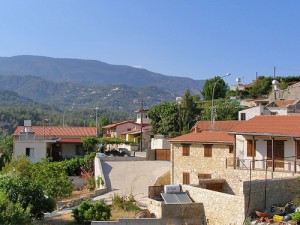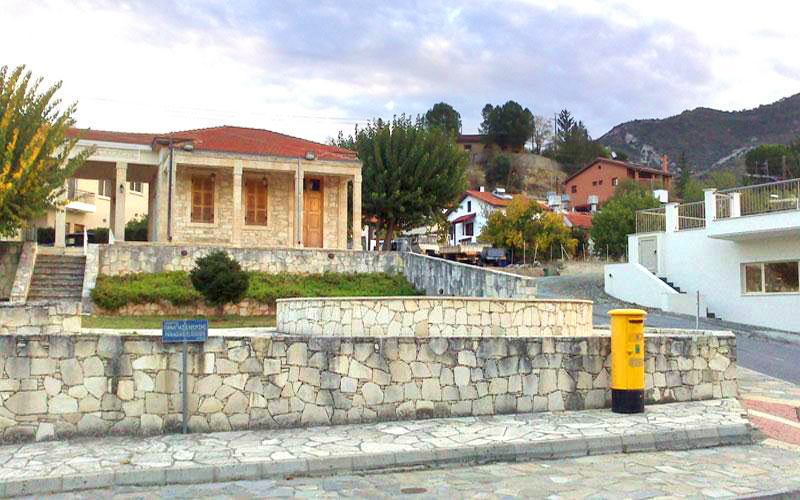
During the summer days you will enjoy the coolness of the village, and in winter you will enjoy the warmth of the fireplace in one of the many rustic taverns.
Local nature
The name of the village consists of two words – “thermal” and “wedge”, which means “sweet spot.” According to another version, the name of the village was given by a local source, the water of which was warm in the winter and in the summer (the Greek name «thermikrini» – ”warm source”).
Thanks to the mild climate of the village, local residents and visitors of the island used to come here for recovery after an illness.
A chain of mountain peaks, the highest of which is Zalaka, surrounds Trimiklini. This mountain “belt” is interrupted only in the southern part of the settlement, where there is a large plain, which is irrigated by the clear waters of the Kouris river, the largest water flow in the island.
Local residents grow grapes and fruit trees (nectarines, peaches, plums and pears) here.They have also long been engaged in the production of zivania and wine, which are the traditional beverages of Cyprus.
In the mid-50’s of the twentieth century they built the Kouri dam on the river; as a result an area of about 14 500 feet turned out to be under water. Over time, the dam turned into a lake of enchanting beauty. In the summer months dozens of fluttering birds come over its calm waters.
By the way, this is the only artificial lake in Cyprus, where the water never dries!
What to see in Trimiklini
Also it’s interesting to mention the Trimiklini bridges. One of them, built more than a century ago on the Kouris river, has three asymmetric arches. The bridge with a width of 2.5 meters, previously served for the ease of transportation and was named the Venetian bridge. Just to the north of the bridge there is a “double” bridge, built later.
In the old days this bridge connected the city of Paphos‘ district with the capital and Kalo Horio and Lefkara villages. Local residents share the legend that, on the way from Stavrovouni monastery, St. Helen crossed the bridge, heading to Omodos to deliver to the village’s monastery the particles of the Holy Cross and the Sacred Belt of the Mother of God.
If you turn around and look above, you can see the dam of Saitas village. However, now this dam needs to be repaired, since it was extensively damaged during the fire.
Part of the cultural heritage of the village is the building of the primary school, which opened its doors in 1926. Then, it had an enrollment of 49 students. Now it’s community property, restored by the municipal council. Currently, 11 children from the community attend the new district school.
Be sure to make a stop at the Green Valley waterfall. Of course, this is not the famous Niagara Falls, and it is not as grand as other Cyprus waterfalls – Caledonia and Milomeri. But a walk along the narrow path, hidden in the shade of century-old trees, on a hot summer day would be a real miracle.
You can also cool off by sitting on a bench near Green Valley, after short walk. On the way back you can make a brief stop at a restaurant and have a cup of coffee offered by the restaurant owner. The entrance fee to the waterfall is 5 euros for adults and 3 euros for children.
Not far from the road there are two interesting churches dedicated to the Virgin of Mercy. One is more modern, and the second was built in the middle of the XVIII century. The old one has a flat wooden roof, and there are ancient Byzantine icons in it. This church is dedicated to the miraculous icon of ”Panagia Eleusa”.
Nearby is the monument of the national hero Arminoiotisu Dimitris, who died in 1974 while fighting against the Turkish invaders.
Cyprus winemaking
At a distance of several kilometers from the village on the outskirts, one of the most famous wineries of Cyprus – Tsiakkas – is located. Passing by the fruit market, pay attention to the sign to Agros village and turn right. Within minutes, you will see a sign that leads you to the winery.
Its founder – Mr. Costas Tsiakkas, was the head of one of the largest banks in Cyprus until 1999. However, he had always dreamed of becoming a winemaker, and this dream came true when he founded his own winery in 1988. In 1999 he left the presidency of the bank and put all his energy and professionalism into his favourite ”creation”.
The pride of Mr.Tsiakkas is Vamvakada Cyprus wine (the local name of Marafeftiko grapes) and the dry rose wine Rodinos. His white wine Sauvignon Blanc has also won numerous awards, which is also a great achievement, since the variety is difficult to grow in the Cyprus climate.
In one day it is impossible to pay attention to all these interesting places, that you will meet on your way: churches and temples, waterfalls and natural monuments, cultural attractions and traditional houses and streets. It is only during a leisurely dinner that the innkeeper can tell you about local legends and share some of the unique history of each of the villages.
Become a keeper of secrets, which the silent mountains of Cyprus keep!
